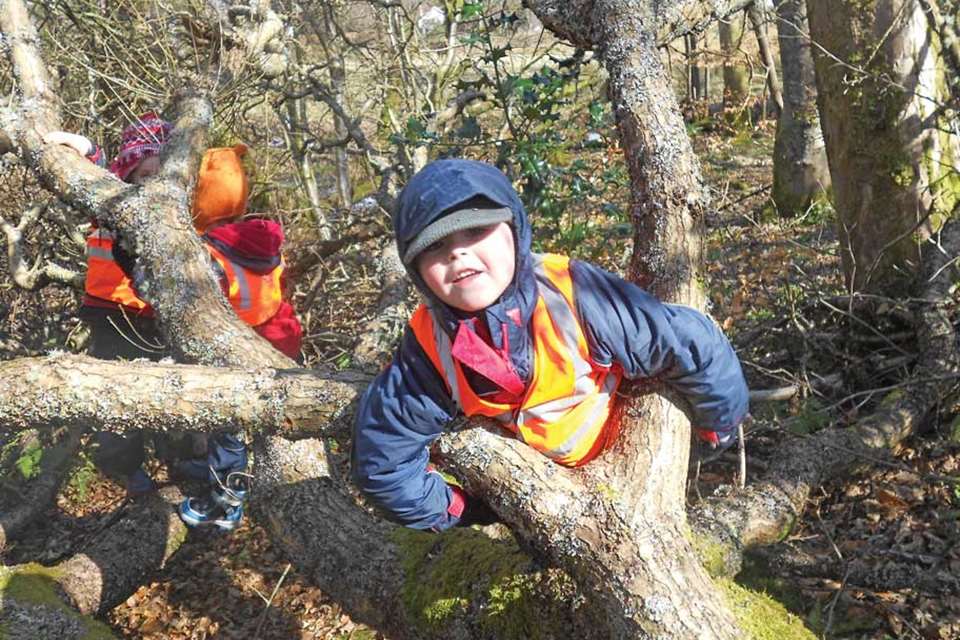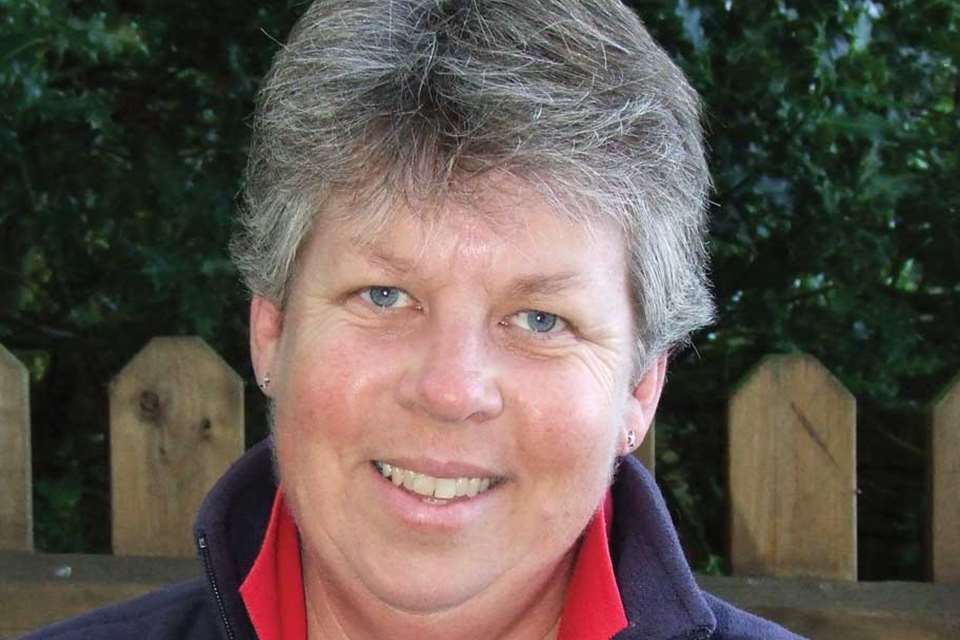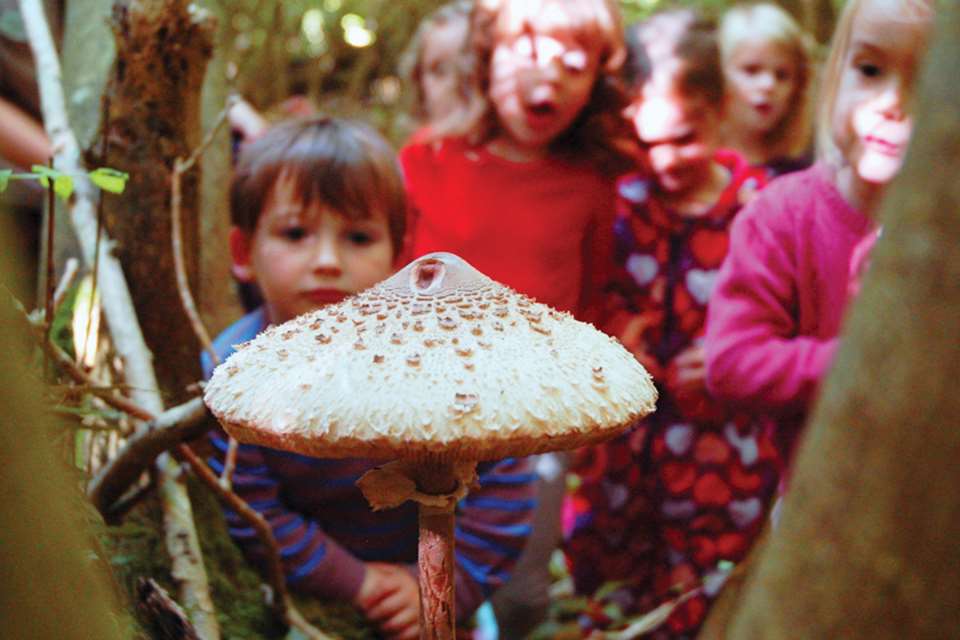Enabling Environments: Forest School - China times
Stuart Welby
Monday, September 21, 2015
Forest school expert Stuart Welby has been training practitioners looking to translate the practice to Chinese, city-based provision. So how did the experience play out for those involved?

I am a Level 4 Forest School trainer and practitioner at Manor House Nursery School in Margate, Kent - Nursery World's Nursery of the Year 2014. The nursery sits in an area of deprivation, with many children needing focused support to develop some of the key skills required for success in school and later life, such as confidence and independence. Since 2010, we have used a forest school to help our children develop these skills, and it is a pedagogical approach that has proved a great success.
With my qualification, I can train fellow practitioners to Forest School Level 3, enabling them to deliver sessions and activities including using tools and fire, but our forest school practice has now grown to support local schools, children's centres and other nurseries.
We were approached by a Chinese company called Lions Education, which was looking to set up its own nursery provision in the city of Guangzhou.
Company staff were travelling the world in search of pedagogical approaches that could sit alongside the company's more formal delivery of early years education and help develop in their children key skills such as risk management, thinking skills, creativity and imagination. Before visiting us, they had looked at Scandinavian approaches, German kindergartens and alternative American pedagogy.
They already had plans to include a forest school in their nursery provision and had looked at the success of our outcomes, so they were interested in seeing and using our forest school training.
ADVICE AND TRAINING
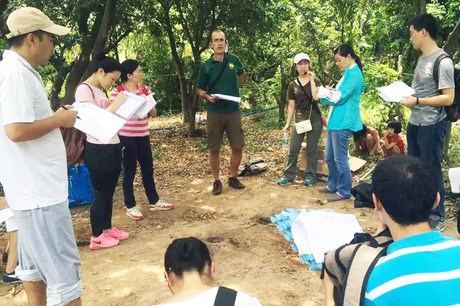
I spent 14 days in China with the Lions group. Part of my time was giving them advice on setting up and maintaining their own outdoor space. We looked at various woodland sites and selected one with three areas: one for challenging physical play (with a big hill, climbing rocks and trees and bushes of various heights), one for free play and tools, and a third for a fire circle.
While I was there I also delivered an eight-day Open College Network Level 3 Forest School course for eight teaching staff. The training included learning and development in an outdoor environment, policies and procedures for running sessions and practical skills and woodland management.
In the final-day assessment, the Chinese teachers were observed and signed off to use their newly acquired practical skills with their children.
Lastly, I ran a session for eight children from the nursery to model best practice and allow the Chinese students to observe in practice the theories discussed during the classroom sessions.
CHALLENGES
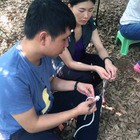 There were various challenges to overcome during my visit.
There were various challenges to overcome during my visit.
Translation
To ensure all the training materials - from PowerPoint presentations to enrolment forms - were translated well, our translator first attended forest school training so she could fully understand the course content. I also used a translator who was very familiar with the course content for each day of the training, as the Chinese group knew little English.
Culture
When looking at emotional intelligence, the Chinese practitioners expressed concerns about hugging and holding children who may be upset or afraid.
Parents, they explained, rarely hold and comfort their children, while Chinese people do not usually acknowledge or respond to the emotions of others.
They also discussed how Chinese society values experience and authority, explaining how younger people naturally respect their elders and people in positions of power. This, they suggested, was one of the main reasons why Chinese children readily accept formal teaching methods without challenge or concern, with the teachers fully respected for their maturity and position.
Climate
The temperature in Guangzhou was about 37 degC, which proved taxing for the practitioners. We discussed the possible effect of the heat on the children, the need to observe them throughout the session and how to respond to soaring temperatures, perhaps by changing plans, shortening sessions or providing shelter, drinks or activities to keep children cool.
Due to the heat, I decided to spend mornings outside covering practical skills and afternoons in the classroom.
Vegetation
In forest school training, practitioners learn about the plants and animals on their site to alert them to any poisonous or dangerous species that may need to be removed, and to inform them about which wood they can use for tools and fire. However, the species on the Chinese site were unfamiliar to me, so I arranged for a botanist to visit and list everything.
BENEFITING FROM THE EXPERIENCE
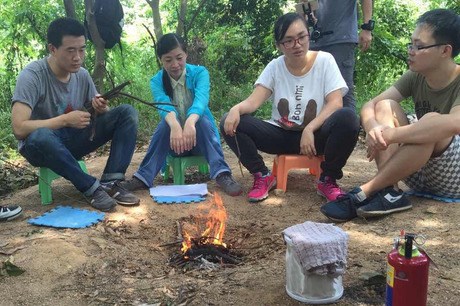
I was encouraged by the practitioners' attitude and enthusiasm, though initially they appeared reluctant to answer questions or make comments. However, I soon observed in them the same positive changes that I see in children who have attended forest school - something we discussed together.
Once relaxed and happy to speak about their practice, they explained they generally work one to one with children, giving them little experience of working with bigger groups, or even in a nursery environment. And although they appeared to have a good understanding of child development, no one could give any examples of theory seen in practice - perhaps due partly to their limited experience of observing children's social play.
However, the practitioners had a great attitude towards the children. They talked about how they put their children's needs ahead of the parents' and want to support children's social development and encourage confidence and feelings of self-worth.
Each day of training inclu- ded time for reflection, which really helped them understand the forest school approach. The extent to which they had embraced the forest school ethos became evident during my session with the children, when all the practitioners supported me independently, without any prompting.
They had already undertaken a risk assessment of the site for me, they helped with two children who appeared concerned about leaving their parents and encouraged the children during the session, adapting the plan and supporting the children when it started to rain.
IN PRACTICE
 The practitioners have plans to provide children with a regular programme of forest school across the school year, in addition to their experiences at nursery. Their aim is to be more holistic in their approach, focusing on the whole child and not just academic success.
The practitioners have plans to provide children with a regular programme of forest school across the school year, in addition to their experiences at nursery. Their aim is to be more holistic in their approach, focusing on the whole child and not just academic success.
They also want their children to have greater access to outdoor play, and risk-taking, because of the lack of outside play space in the city. In addition, parents often work long hours, so have little time to take their children out and worry about their child playing outside.
ANOTHER VISIT
I have been asked to deliver more training with this group in November. They want to train enough practitioners to ensure that the forest school is delivered with appropriate adult support and plan to adopt this approach at new nurseries that they will be running.
I have also been asked to look at possible sites for two other nursery providers in different parts of China. More early years professionals are now looking at additional ways to support their children and have been encouraged by government reforms and parental wishes. This may well become a longer-term project and I am excited and interested to see how the children and their parents respond to it.
MORE INFORMATION
Early Years: guide to the 0-25 SEND code of practice, Department for Education (2014)
Inclusion in the EYFS, K Mathieson (2015), London Open University Press
SEN and disability in the early years: A toolkit, Council for Disabled Children and 4Children (2015), at www.foundationyears.org.uk
What to Expect, When?, www.foundationyears.org.uk.


